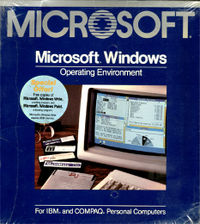
What brings this up is news that open source is being banned from the “app stores” which will support the Xbox and the new Nokia Windows phones.
My old friend Rupert Goodwins at ZDNet UK put it best. It's Apple envy.
Red Hat's Jon Wildeboer was the first to blog about this and others have followed suit including good ol' Simon Phipps, who noted that Microsoft has even, in theory, banned its own open source licenses through this action.
What no one seems to have asked so far is why. Those who read this week's Clue have the answer at hand.
It's situational ethics.

In this case it's just that there's a huge difference in scale between a general operating system like Windows or Linux, and a specialized operating system running something like a phone or game machine. As we've discussed just today, every once in a while you tear down the building and start over. This is how Apple beat Windows, and it's how Nintendo beat the Xbox and Playstation.
When you start with a new platform, a blank sheet of paper, you can write something that's simple. As it gets more complex, as people get their hands on it, this will change. But not now.
Apple is foolish enough to think its iOS will be immune to this growing complexity, that it's totally modular, that apps can be simple, plug-and-play, as throwaway as toilet paper.
True for now. But not forever

In the end cities are better than any building within them. But not if you're the owner of an individual building. Not when the building is new and the rats haven't yet gotten to it.
America has been doing something similar for two generations now. Suburbs have become exurbs, and each time one goes in we flock to it, thinking that now here is something clean and bright and new. But what we've found is that nothing stays new, that time wounds all heals. America's ghettoes are now just as often suburbs as they are inner cities. Some think they can solve this problem by building legal walls around the places where rich people live, or by moving even-further out and building again.
But in the end it's the city where the vibrancy lives. Cities degrade just like suburbs. They have to be rebuilt from the inside-out every once in a while, and that's very expensive.
But cities are worth it. General purpose operating systems are worth it.
Microsoft and Apple have built themselves some nice cul de sacs, but in time either the city will roll over them or they'll become sterile of their own accord. Their hope will be to have milked those suburbs for all the profit they can before the day of reckoning, then move on.
Fine for them. Not so fine for the people moving in. Unless you recognize the truth that iPhones and Xboxes and the rest are disposable. Don't let yourself get too invested in them, because they're not built to last.










